
adding depth to touch interaction

adding depth to touch interaction |
|
PreCursor introduces an invisible layer that hovers just in
front of the computer screen, extending the capabilities of
current touch screen displays.
 ABOUT
When using a computer mouse, there are three levels of
depth. We are given the ability to hover, a low-commitment
action that gives short feedback; mice also allow click, a
medium-level of commitment that selects or highlights,
moving components from passive to active states; and
finally, a double click provides the highest level of
commitment, allowing users to delve into a folder or open
an application. Present touch screen displays, on the other
hand, lack this hierarchical structure of interactions and is
limited to one level of depth: a simple click.
Hardware Implementation. At the base of the computer screen, there is an infrared laser, fitted with a line cap, that shines upward, creating an invisible light plane that hovers parallel to and just in front of the computer screen. Software Mapping Algorithm. PreCursor is an extension of the Mouseless project (top) and it uses the same technology. When the user’s finger interrupts the invisible light plane created by the IR laser, the infrared light illuminates the finger from the bottom, creating a bright blob that the two cameras can interpret. The algorithm used in PreCursor draws from topics in geometry (namely, triangulation and epipolar geometry) to compute the position of the finger. PICTURES
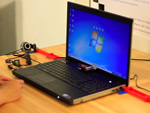
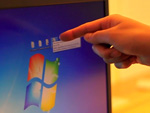
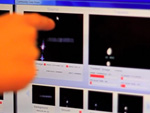
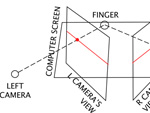
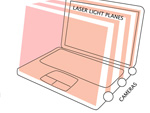
VIDEOS
CONTACT US
Pranav Mistrypranav@mit.edu | www.pranavmistry.com Heidi Wang hwang2@wellesley.edu |
|

|
© 2011. Pranav Mistry |